Olympic Games: Major international multi-sport event organised by International Olympic Committee
The Olympic Games (French: Jeux olympiques) is an important international event featuring summer and winter sports.
Summer Olympic Games and Winter Olympic Games are held every four years. Originally, the ancient Olympic Games were held in Ancient Greece at Olympia. The first games were in 776 BC. They were held every four years until the 6th century AC. The first "modern" Olympics took place in 1896 in Athens, Greece. Athletes participate in the Olympics Games to represent their countries.

Over time the Olympics have become bigger. In old times, women were not allowed, but now there are women's events. The Winter Games were created for ice and snow sports. The Paralympic Games were created for athletes with physical disabilities. As well, the Olympics became bigger with the addition of the Youth Olympic Games for teenage athletes. World War I and World War II led to the cancellation of the 1916, 1940, and 1944 Games. As the decision-making body, the International Olympic Committee (IOC) is responsible for choosing the host city for each Olympic Games. The IOC is also responsible for choosing what sports are in the games. The creator of modern Olympics is Baron Pierre de Coubertin.
The celebration of the Games includes many rituals and symbols, such as Olympic flag and torch, as well as the opening and closing ceremonies. The first, second, and third-place finishers in each event receive, respectively, gold, silver, and bronze medals.
Ancient Olympics

The Olympics of Ancient Greece featured mainly athletic but also combat and chariot racing events. During the Olympic Games all struggles among the participating city-states were postponed until the games were finished. The origin of these Olympics is shrouded in mystery and legend According to legend, it was Heracles who first called the Games "Olympic" and established the custom of holding them every four years. The most widely accepted date for the beginning of the Ancient Olympics is 776BC; based on inscriptions of the winners of a footrace held every four years starting then. The Ancient Games featured running events, a pentathlon (consisting of a jumping event, discus and javelin throws, a foot race and wrestling), boxing, wrestling, and equestrian events.
There is no agreement on when the Games officially ended, but many historians think it is 393 AD, when the Christian Roman emperor Theodosius I declared that all Pagan religious practices should end. Another date might be 426 AD, when the next emperor Theodosius II ordered the destruction of all Greek temples. After the Olympics stopped, they were not held again until the late 19th century.
The Growth of the Olympics
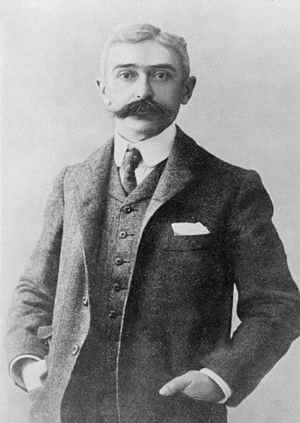
An attempt to copy the ancient Olympic Games was the L'Olympiade de la République annually from 1796 to 1798 in Revolutionary France. The competition had several sports from the ancient Greek Olympics.
Greek interest in bringing back the Olympic Games began with the Greek War of Independence from the Ottoman Empire in 1821. It was first proposed by poet and newspaper editor Panagiotis Soutsos in his poem "Dialogue of the Dead", published in 1833. Evangelis Zappas, a wealthy Greek-Romanian philanthropist, first wrote to King Otto of Greece, in 1856, offering to fund a permanent revival of the Olympic Games. Zappas sponsored the first Olympic Games in 1859, which was held in Athens. Athletes from Greece and the Ottoman Empire participated. Zappas funded the restoration of the ancient Panathenaic stadium so that it could host all future Olympic Games.
Between 1862 and 1867, Liverpool held an annual Grand Olympic Festival. It was created by John Hulley and Charles Melly, with support from Dr. Brookes. These games were unfair in nature since only Men could compete. In 1865 Hulley, Dr. Brookes and E.G. Ravenstein founded the National Olympian Association in Liverpool, a forerunner of the British Olympic Association. Its articles of foundation provided the framework for the International Olympic Charter.
Dr. Brookes copied the sports which were in the Olympics held in Athens in 1859 in future Wenlock Olympian Games (Brookes created this first as a class in 1850 and then as an event in 1856.). In 1866, a national Olympic Games in Great Britain was organized by Dr. Brookes at London's Crystal Palace.
The Panathinaiko Stadium hosted Olympics in 1870 and 1875. Thirty thousand spectators attended that Games in 1870, although no official attendance records are available for the 1875 Games. In 1890, after attending the Olympian Games of the Wenlock Olympian Society, Baron Pierre de Coubertin created the International Olympic Committee. Coubertin built on the ideas and work of Brookes and Zappas with the aim of creating an Olympic Games that would occur every four years in a different country. He presented these ideas during the first meeting of the newly created International Olympic Committee (IOC). This meeting was held from June 16 to June 23, 1894, at the Sorbonne University in Paris. On the last day of the meeting, it was decided that the first Olympic Games, to be controlled by the IOC, would take place two years later in Athens. The IOC elected the Greek writer Demetrius Vikelas as its first president.
1896 Games

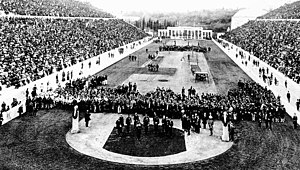
The first Games held under the IOC was hosted in the Panathenaic stadium in Athens in 1896. These Games brought 14 nations and 241 athletes who competed in 43 events. Zappas and his cousin Konstantinos Zappas had left the Greek government money to fund future Olympic Games. This money was used to pay for the 1896 Games. George Averoff paid for the refurbishment of the stadium in preparation for the Games. The Greek government also provided money, which was paid back through the sale of tickets. Money was also paid back through the sale of the first Olympic commemorative stamp set.
The Greek officials and public were excited about hosting these Games. This feeling was shared by many of the athletes, who even demanded that Athens be the host of the Olympic Games on a permanent basis. The IOC did not approve this request. The IOC stated that each games would be held in a different country.
Changes and adaptations
Following the success of the 1896 Games, the Olympics entered a period of stagnation that threatened their survival. The Olympic Games held at the Paris Exposition in 1900 and the World's Fair at St. Louis in 1904 were side-shows. The Games at Paris did not have a stadium, however this was the first time women took part in the games. The St. Louis Games hosted 650 athletes, but 580 were from the United States. The homogeneous nature of these celebrations was a low point for the Olympic Movement. The Games rebounded when the Intercalated Games (so-called because they were the second Games held within an Olympiad, a period of time lasting four years) were held in Athens. These Games are not officially recognized by the IOC and no Intercalated Games have been held since. These Games were hosted at the Panathenaic stadium in Athens. The games attracted an international field of participants and generated great public interest.
Between 1912 and 1948 art competitions were a part of the Olympics. Medals were awarded for works of art inspired by sport, divided into five categories: architecture, literature, music, painting, and sculpture. The juried art competitions were abandoned in 1954 because artists were considered to be professionals, while Olympic athletes were required to be amateurs. The competitions were part of the original intention of the Olympic Movement.
Winter Games

The Winter Olympics were created for snow and ice sports that were not part of the Summer Games. Figure skating (in 1908 and 1920) and ice hockey (in 1920) were Olympic events at the Summer Olympics. At the 1921 Olympic Congress, in Lausanne, it was decided to hold a winter version of the Olympic Games. A winter sports week (actually 11 days) was held in 1924 in Chamonix, France. The IOC ruled that the Winter Olympic Games be celebrated every four years on the same year as the summer games. This pattern continued until the 1992 Games in Albertville, France. After this, beginning with the 1994 Games, the Winter Olympics were held on the third year of each Olympiad.
Youth Games
Starting in 2010, Youth Games help to develop young athletes for the Olympic Games. Athletes between the ages of 14 and 18 compete. The Youth Olympic Games were created by IOC president Jacques Rogge in 2001 and approved during the 119th meeting of the IOC. The first Summer Youth Games were held in Singapore from 14 to 26 August 2010. The first Winter Games was hosted in Innsbruck, Austria, in 2012. These Games are shorter than the Olympic Games. The summer version will last twelve days and the winter version will last nine days. The IOC will allow 3,500 athletes and 875 officials to take part at the Summer Youth Games. 970 athletes and 580 officials will take part at the Winter Youth Games. The sports to be played will be the same as at the Olympic Games.
Olympic Movement

The Olympic Movement includes a large number of national and international sporting organizations and federations. As the group in charge of the Olympic Movement, the International Olympic Committee (IOC) is responsible for selecting the host city. Overseeing the planning of the Olympic Games. Changing the sports involved. Agreeing sponsorship and broadcasting rights.
The Olympic Movement is made of three major elements:
- International Federations (IFs) are the governing bodies that supervise a sport at an international level. For example, the International Federation of Association Football (FIFA) is the IF for football (soccer), and the Fédération Internationale de Volleyball (FIVB) is the international governing body for volleyball. There are 35 IFs in the Olympic Movement, representing each Olympic sport.
- National Olympic Committees (NOCs) represent and regulate the Olympic Movement within each country. For example, the United States Olympic Committee (USOC) is the NOC of the United States. There are currently 205 NOCs recognized by the IOC.
- Organizing Committees for the Olympic Games (OCOGs) are the temporary groups responsible for the organization of a specific Olympic Games. Each group is dissolved (taken apart) after each Games, once the final report is delivered to the IOC.
French and English are the official languages of the Olympic Movement. The other language used at each Olympic Games is the language of the host country.
Controversy
In 1998, it was uncovered that several IOC members had taken bribes from members of the Salt Lake City bid committee for the hosting of the 2002 Winter Olympics. This was done to make sure that Salt Lake City won. The IOC investigated and four members resigned and six people were sacked.
A BBC documentary entitled Panorama: Buying the Games, aired in August 2004, investigated the taking of bribes in the bidding process for the 2012 Summer Olympics. The documentary claimed it was possible to bribe IOC members into voting for a particular candidate city. After being narrowly defeated in their bid for the 2012 Summer Games, Parisian Mayor Bertrand Delanoë accused the British Prime Minister Tony Blair and the London Bid Committee of breaking the bid rules.
The Turin bid for the 2006 Winter Olympics was also shrouded in controversy. A prominent IOC member, Marc Hodler, strongly connected with the rival bid of Sion, Switzerland, alleged bribery of IOC officials by members of the Turin Organizing Committee. These accusations led to a wide-ranging investigation. The allegations also served to sour many IOC members against Sion's bid and potentially helped Turin to capture the host city nomination.
Symbols
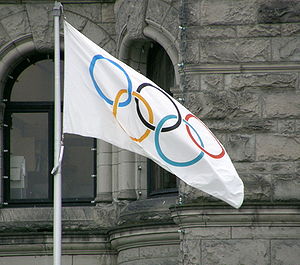
The Olympic logo also known as the Olympic rings, consists of five intertwined rings and represents the unity of the five inhabited continents (America, Africa, Asia, Australia, Europe). The colored version of the rings—blue, yellow, black, green, and red—over a white field forms the Olympic flag. The flag was adopted in 1914 but flown for the first time at the 1920 Summer Olympics in Antwerp, Belgium. The flag has since been flown during every Games. The Olympic motto is Citius, Altius, Fortius, a Latin expression meaning "Faster, Higher, Stronger".
Before each Games, the Olympic flame is lit in Olympia in a ceremony that reflects ancient Greek rituals. A female performer, acting as a priestess, lights a torch with the use of the sun. The woman then lights the torch of the first relay bearer. Starting the Olympic torch relay that will carry the flame to the host city's Olympic stadium. The flame has been an Olympic symbol since 1928 and the torch relay was introduced at the 1936 Summer Games.
The Olympic mascot was introduced in 1968. The mascot is either an animal or human figure representing the cultural heritage of the host country.
Ceremonies
Opening

As mandated by the Olympic Charter, various elements frame the opening ceremony of the Olympic Games. Most of these rituals were established at the 1920 Summer Olympics in Antwerp. The ceremony typically starts with the hoisting of the host country's flag and a performance of its national anthem. The host nation then presents artistic displays of music, singing, dance, and theater representative of its culture.
After the artistic portion of the ceremony, the athletes parade into the stadium grouped by nation. Greece is traditionally the first nation to enter in order to honor the origins of the Olympics. Nations then enter the stadium alphabetically according to the host country's chosen language. The host country's athletes are always the last to enter. During the 2004 Summer Olympics, which was hosted in Athens, Greece. The Greek flag entered the stadium first and last. When it came in to the stadium for the second time it was followed by the athletes. Speeches are then given formally opening the Games. Finally the athletes oath said. Following this the Olympic torch is brought into the stadium and passed on until it reaches the final torch carrier who lights the cauldron.
Closing

The closing ceremony of the Olympic Games takes place after all sporting events have concluded. Flag-bearers from each participating country enter the stadium. They are followed by the athletes who enter together without any national distinction. Three national flags are hoisted while the corresponding national anthems are played. The flag of Greece to honor the birthplace of the Olympic Games. The flag of the current host country. The flag of the country hosting the next Summer or Winter Olympic Games is also flown. The president of the organizing committee and the IOC president make their closing speeches. The Games are officially closed and the Olympic flame is put out. In what is known as the Antwerp Ceremony (as this tradition was started in Antwerp), the mayor of the city that organized the Games transfers a special Olympic flag to the president of the IOC. The president then passes it on to the mayor of the city hosting the next Olympic Games. After these compulsory elements, the next host nation briefly introduces itself with artistic displays of dance and theater representative of its culture.
Medal presentation

A medal ceremony is held after each Olympic event is concluded. The winner, second and third-place competitors or teams stand on top of a three-tiered rostrum to be awarded their respective medals. After the medals are given out by an IOC member, the national flags of the three medalists are raised while the national anthem of the gold medalist's country plays.
Sports
The Olympic Games program consists of 26 sports, 30 disciplines and nearly 300 events. For example, wrestling is a Summer Olympic sport, comprising two disciplines: Greco-Roman and Freestyle. It is broken down into fourteen events for men and four events for women. Each event represents a different weight class. The Summer Olympics program includes 26 sports, while the Winter Olympics program features 15 sports.
Olympic sports are governed by international sports federations (IFs) recognized by the IOC as the global supervisors of those sports. There are 35 federations represented at the IOC. Changes can happen to the list of sports in the Olympics. Sports can be added or removed from the list on the basis of a two-thirds majority vote of the members of the IOC.
The 114th IOC meeting, in 2002, limited the Summer Games program to a maximum of 28 sports, 301 events, and 10,500 athletes. Three years later, at the 117th IOC Session, the first major change to the list was performed. This resulted in the removal of baseball and softball from the list of sports for the 2012 London Games. Since there was no agreement in the promotion of two other sports, the 2012 program will feature just 26 sports. The 2016 and 2020 Games will return to the maximum of 28 sports given the addition of rugby and golf.
Amateurism and professionalism

The exclusion of professionals caused several controversies throughout the history of the modern Olympics. The 1912 Olympic pentathlon and decathlon champion Jim Thorpe was stripped of his medals when it was discovered that he had played semi-professional baseball before the Olympics. His medals were restored by the IOC in 1983 on compassionate grounds. As class structure evolved through the 20th century, the definition of the amateur athlete as an aristocratic gentleman became outdated. The advent of the state-sponsored "full-time amateur athlete" of the Eastern Bloc countries further eroded the ideology of the pure amateur, as it put the self-financed amateurs of the Western countries at a disadvantage. Nevertheless, the IOC held to the traditional rules regarding amateurism.
Beginning in the 1970s, amateurism requirements were gradually phased out of the Olympic Charter. After the 1988 Games, the IOC decided to make all professional athletes eligible for the Olympics, subject to the approval of the IFs. As of 2004, the only sport in which no professionals compete is boxing, although even this requires a definition of amateurism based on fight rules rather than on payment, as some boxers receive cash prizes from their National Olympic Committees. In men's football (soccer), only three professional players over the age of 23 are eligible to participate per team in the Olympic tournament.
Controversies
Boycotts

There have been many countries deliberately missing the Olympics in order to make political statements. The most famous examples of countries missing the Olympics happened in 1980 and 1984. The Cold War opponents missed each other's Games. 65 nations refused to compete at the Moscow Olympics in 1980 because of the Soviet invasion of Afghanistan. The Soviet Union and 14 of its Eastern Bloc partners (except Romania) countered by missing the Los Angeles Olympics of 1984. The countries stated that they could not guarantee the safety of their athletes. Soviet officials defended their decision to withdraw from the Games by saying that "chauvinistic sentiments and an anti-Soviet hysteria are being whipped up in the United States".
Politics
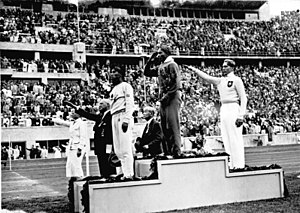
The Olympic Games have been used as a platform to promote political ideologies almost from its inception. Nazi Germany wished to portray the Nationalist Socialist Party as benevolent and peace-loving when they hosted the 1936 Games. The Games were also intended to show the superiority of the Aryan (white) race. This goal was not met due in part to the achievements of athletes such as Jesse Owens, who won four gold medals at this Olympics.
Individual athletes have also used the Olympic stage to promote their own political agenda. At the 1968 Summer Olympics, in Mexico City, two American track and field athletes, Tommie Smith and John Carlos, who finished first and third in the 200meter sprint race, performed the Black Power salute on the podium. The runner up Peter Norman wore an Olympic Project for Human Rights badge in support of Smith and Carlos. IOC President Avery Brundage then told the United States, to either send the two athletes home or withdraw the track and field team. The United States chose to send the pair home.
Use of performance enhancing drugs
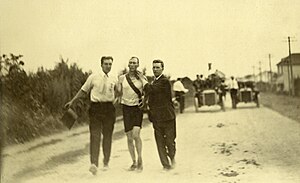
In the early 20th century, many Olympic athletes began using drugs to improve their athletic abilities. For example, the winner of the marathon at the 1904 Games, Thomas J. Hicks, was given strychnine and brandy by his coach. The only Olympic death linked to doping happened at the Rome Games of 1960. During the cycling road race, Danish cyclist Knud Enemark Jensen fell from his bicycle and later died. A coroner's inquiry found that he was under the influence of amphetamines. By the mid-1960s, sports federations were starting to ban the use of performance-enhancing drugs. The IOC did likewise in 1967. The IOC created the World Anti-Doping Agency in 1999. The IOC-established drug testing regimen (now known as the Olympic Standard) has set the worldwide benchmark that other sporting federations around the world attempt to emulate. The first Olympic athlete to test positive for the use of performance-enhancing drugs was Hans-Gunnar Liljenwall, a Swedish pentathlete at the 1968 Summer Olympics, who lost his bronze medal for alcohol use.
Violence
The Olympics have not brought lasting peace to the world, even during the Games. Three Olympic Games were not held due to war. The 1916 Games were cancelled because of World War I, and the summer and winter games of 1940 and 1944 were cancelled because of World War II. Terrorism has also threatened the Olympic Games. In 1972, when the Summer Games were held in Munich, West Germany, eleven members of the Israeli Olympic team were taken hostage by the terrorist group Black September. This event is now known as the Munich massacre. The terrorists killed two of the athletes soon after they had taken them hostage and killed the other nine during a failed rescue attempt. A German police officer and 5 terrorists also died. During the Summer Olympics in 1996 in Atlanta, a bomb was detonated at the Centennial Olympic Park, which killed 2 and injured 111 others. Eric Robert Rudolph is currently serving a life sentence for the bombing.
Host nations and cities

The host city for an Olympic Games is chosen seven years ahead of the event. The process of selection is carried out in two phases that span a two-year period. The process starts when a city wanting to host the games applies to its country's Olympic group. If more than one city from the same country gives a proposal to its NOC, the national group chooses which city will run for host. The first step once the deadline passes (To tell the IOC that you want to hold the Games), is to ask the cities to complete a questionnaire which covers many key points in the organization of the Olympic Games. The evaluation of the filled questionnaires by a group provides the IOC with an idea of each cities project and their potential to host the Games. On the basis of this evaluation, the IOC chooses the applicants that will proceed to the candidature stage.
Once the candidate cities are chosen, they must give to the IOC a bigger presentation of their project as part of a candidature file. Each city is analyzed by an evaluation group. This group will also visit the cities. The group give a report on its findings one month prior to the IOC's final decision. During the interview process the candidate city must also guarantee that it can fund the Games. The IOC members gathered in the meeting have the final vote on the host city.
By 2016, the Olympic Games will have been hosted by 44 cities in 23 countries. The United States has hosted four Summer and four Winter Olympics, more than any other nation. Among Summer Olympics host nations, the United Kingdom has been the host of three Games, and hosted its third Olympics in 2012 in London. Germany, Australia, France, and Greece are the other nations to have hosted the Summer Olympics twice. Among host cities, only Los Angeles, Paris, Athens and London have played host to the Olympic Games more than once, with each holding that honor twice. With the 2012 Games that took place in London, the British capital holds the distinction of hosting the modern Olympics Games three times, more than any other city. Paris will be the second city to host the modern Olympics Games three times in 2024, while Los Angeles will be the third city in 2028.
In the Winter Olympics, France has hosted three Games, while Switzerland, Austria, Norway, Japan, and Italy have hosted twice. The most recent Games were held in Pyeongchang, South Korea's first Winter Olympics and second overall. The next Winter Games will be in Beijing, China in 2022, which will be the first time this nation has hosted.
And Youth Olympic Games in a separate list.
Summer Olympics (with successors)
| No. | Nation | Gold | Silver | Bronze | Total |
|---|---|---|---|---|---|
| 1 |  United States (USA) United States (USA) | 1061 | 836 | 739 | 2636 |
| 2 |  Russia (RUS) Russia (RUS) | 610 | 514 | 503 | 1627 |
| 3 |  Germany (GER) Germany (GER) | 438 | 455 | 490 | 1383 |
| 4 |  Great Britain (GBR) Great Britain (GBR) | 285 | 316 | 315 | 916 |
| 5 |  China (CHN) China (CHN) | 262 | 199 | 173 | 634 |
| 6 |  France (FRA) France (FRA) | 222 | 253 | 274 | 749 |
| 7 |  Italy (ITA) Italy (ITA) | 216 | 188 | 213 | 617 |
| 8 |  Hungary (HUN) Hungary (HUN) | 181 | 154 | 176 | 511 |
| 9 |  Japan (JPN) Japan (JPN) | 169 | 150 | 178 | 497 |
| 10 |  Australia (AUS) Australia (AUS) | 164 | 170 | 209 | 543 |
Related pages
Notes
Further reading
- Buchanan, Ian (2001). Historical dictionary of the Olympic movement. Lanham: Scarecrow Presz. ISBN 978-0-8108-4054-6.
- Burkert, Walter (1983). "Pelops at Olympia". Homo Necans. University of California Press. ISBN 0-520-05875-5.
- Kamper, Erich; Mallon, Bill (1992). The Golden Book of the Olympic Games. Milan: Vallardi & Associati. ISBN 978-88-85202-35-1.
- Preuss, Holger; Marcia Semitiel García (2005). The Economics of Staging the Olympics: A Comparison of the Games 1972–2008. Edward Elgar Publishing. ISBN 978-1-84376-893-7.
- Simson, Vyv; Jennings, Andrew (1992). Dishonored Games: Corruption, Money, and Greed at the Olympics. New York: S.P.I. Books. ISBN 978-1-56171-199-4.
- Wallechinsky, David (2004). The Complete Book of the Summer Olympics, Athens 2004 Edition. SportClassic Books. ISBN 978-1-894963-32-9.
- Wallechinsky, David (2005). The Complete Book of the Winter Olympics, Turin 2006 Edition. SportClassic Books. ISBN 978-1-894963-45-9.
Other websites

- Official website
- Fandom has a wiki on this subject: Olympic
- New York Times Interactive of all the medals in the Modern Olympics
- All the daily program and the results of the Olympics (personal website)
- ATR – Around the Rings – the Business Surrounding the Olympics
- Database Olympics
- Dicolympic Archived 2008-09-29 at the Wayback Machine – Dictionary about the Games from Olympia to Sochi 2014
- Reference book about all Olympic Medalists of all times
 Youth Olympic Games Youth Olympic Games | ||
|---|---|---|
| Summer Games: Singapore 2010, Nanjing 2014, Buenos Aires 2018, Dakar 2026 | ||
| Winter Games: Innsbruck 2012, Lillehammer 2016, Lausanne 2020, Gangwon 2024 | ||
| Gangwon 2024 — Dakar 2026 | ||
This article uses material from the Wikipedia Simple English article Olympic Games, which is released under the Creative Commons Attribution-ShareAlike 3.0 license ("CC BY-SA 3.0"); additional terms may apply (view authors). Content is available under CC BY-SA 4.0 unless otherwise noted. Images, videos and audio are available under their respective licenses.
®Wikipedia is a registered trademark of the Wiki Foundation, Inc. Wiki Simple English (DUHOCTRUNGQUOC.VN) is an independent company and has no affiliation with Wiki Foundation.






























